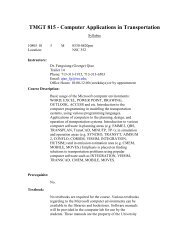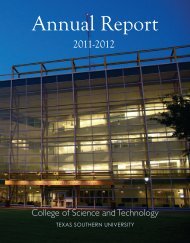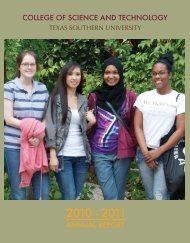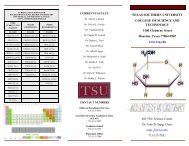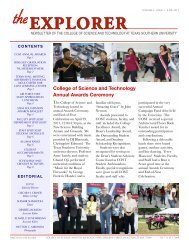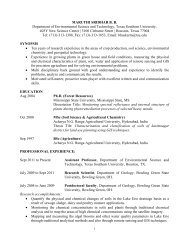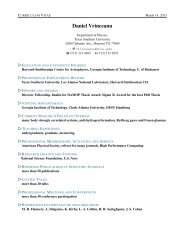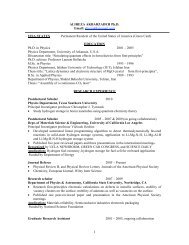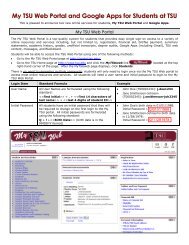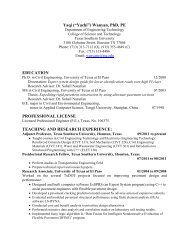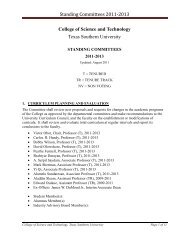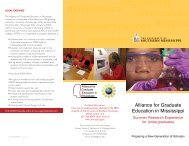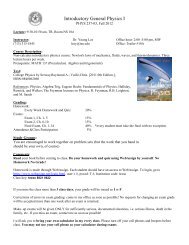Faculty Manual - COST Home Page - Texas Southern University
Faculty Manual - COST Home Page - Texas Southern University
Faculty Manual - COST Home Page - Texas Southern University
You also want an ePaper? Increase the reach of your titles
YUMPU automatically turns print PDFs into web optimized ePapers that Google loves.
ecommendations of the department chairperson and dean, with the approval of<br />
the President, for study done during a regular academic year.<br />
2) Salary increments may be given to a faculty member in keeping with his/her<br />
rank and with the recommendations of the department chairperson and dean,<br />
with the approval of the President, for study done during a regular academic<br />
year.<br />
3) Only graduate credit from an accredited institution applicable toward the<br />
doctorate or equivalent professional degree will be considered. No increment is<br />
granted for credit earned prior to the master’s degree.<br />
5.17 Outside Private Employment<br />
Outside employment includes both consulting activities and other compensated outside activities<br />
of faculty members. Consulting work is defined as professional work performed outside<br />
university auspices that are substantively related to the faculty member’s area of expertise and<br />
duties at the university. Outside activities refers to employment or business activities, other than<br />
personal and private financial transactions) designated to enhance the income or wealth of the<br />
faculty member but not directly related to his/her area of expertise as a faculty member.<br />
Excessive involvement in outside employment can have a detrimental effect on performance of<br />
professional duties. Such lowered professional performance will affect decisions regarding<br />
promotion, tenure and salary.<br />
A. Consulting. Members of the faculty of the <strong>University</strong> should not be discouraged from<br />
providing consultation or other professional services on a private basis outside the<br />
<strong>University</strong>. Such activities can benefit students by providing opportunities for enriched<br />
teaching and research, thus supporting the basic academic benefit by having its faculty<br />
maintain continuing contact with non-academic problems in the non-academic world.<br />
Thus, the <strong>University</strong> encourages consulting activities, provided that such activities<br />
present no conflicts of interest and do not diminish the quantity and quality of<br />
professional services rendered to the university as part of faculty member’s duties and<br />
responsibilities.<br />
B. Outside full-time employment. Members of the faculty may not accept regular fulltime<br />
employment with units outside the <strong>University</strong> because this action would be<br />
divisive of loyalties and does not provide the return to the <strong>University</strong> indicated in item<br />
1.<br />
C. Conflict of interest. Conflicts of interests should be avoided in all instances of outside<br />
employment. Conflict of interest in an academic institution means outside activity,<br />
which intrudes upon the academic functions of teaching, scholarly activities, and<br />
service to the <strong>University</strong>.<br />
D. Use of <strong>University</strong> Facility and Equipment. A member of the <strong>University</strong> faculty shall<br />
not use the <strong>University</strong>’s name, property, or staff for private gain. A faculty member<br />
may, with the approval of the appropriate <strong>University</strong> officer, engage in endeavors<br />
53



